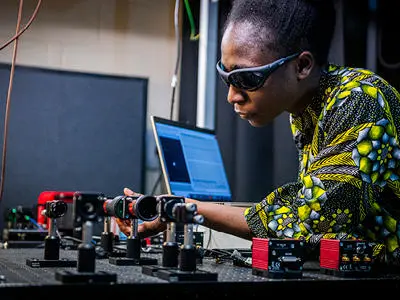Nanophotonics

We explore the interaction of light at the nanoscale, leveraging nanostructures and innovative materials to create ultra-compact, high-efficiency photonic devices. By manipulating light at dimensions smaller than its wavelength, this research enables new possibilities in imaging, display and detection.
A key focus is the development of flat optics and metasurfaces — ultra-thin materials designed to control and shape light. These devices feature multifunctionality, smaller footprints and ultra compactness, paving the way for the discovery of new phenomena and the development of novel prototype devices for future technologies. Applications include edge imaging, polarimetric imaging, 3D holography, cancer diagnosis, twisted light beam generation, 3D polarisation manipulation, and particle manipulation.
By addressing current limitations in device miniaturisation and system integration, nanophotonics research provides robust solutions for industries requiring increasingly compact and efficient optical technologies. This work positions Heriot-Watt at the forefront of light-based nanotechnology, driving next-generation advancements across quantum and optical applications.
Photonics is a world-leading area of research expertise at Heriot-Watt University, recognised in the 2021 Queen's Anniversary Prize for photonics. The Institute of Photonics and Quantum Sciences (IPaQS) is an integral part of a focused research ecosystem, collaborating on aligned projects across our other institutes and global research institutes; The National Robotarium, The Lyell Centre for Earth and Marine Sciences and Technology, The Global Research Institute in Health and Care Technologies, and the iNetZ+ Global Research Institute for Net Zero and Beyond.
By bringing together experts in photonics, and a range of scientific disciplines, in a collaborative environment, the most complex challenges can be tackled. This interdisciplinary approach is strengthened through external partnerships, ensuring the research not only advances scientific understanding but also delivers real-world impact across multiple sectors, from telecommunications to healthcare and precision manufacturing.
Collaborate with us
Related themes and projects

Biomedical photonics
Applying light-based technologies to healthcare, improving diagnostics, monitoring, and treatments through advanced lasers and photonic sensors.

Photonic sensing and measurement
Creating precise instrumentation for extreme environments, supporting fields like medical imaging, environmental monitoring, and defence.

Quantum enhanced sensing and imaging
Developing quantum sensors and imaging techniques that offer unparalleled precision and resolution.

Quantum materials
Pioneering new materials that exploit quantum effects for superior performance, enabling complex magnetic textures or superconductivity.